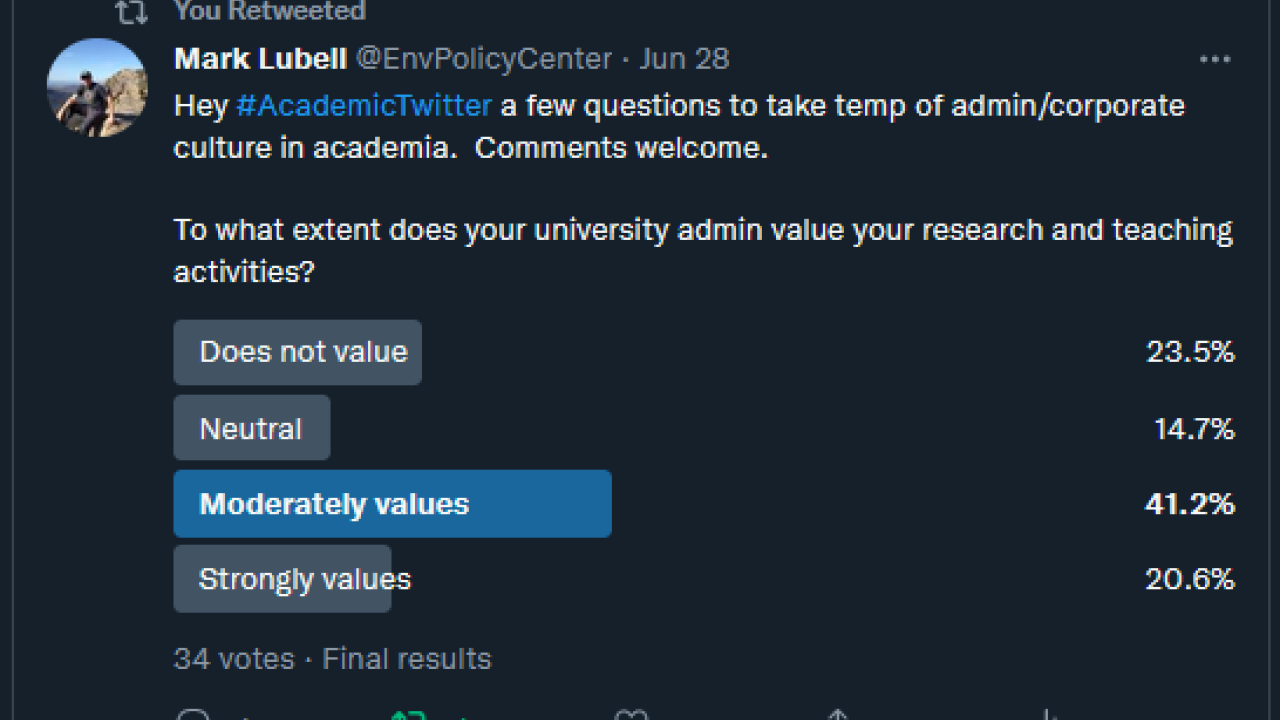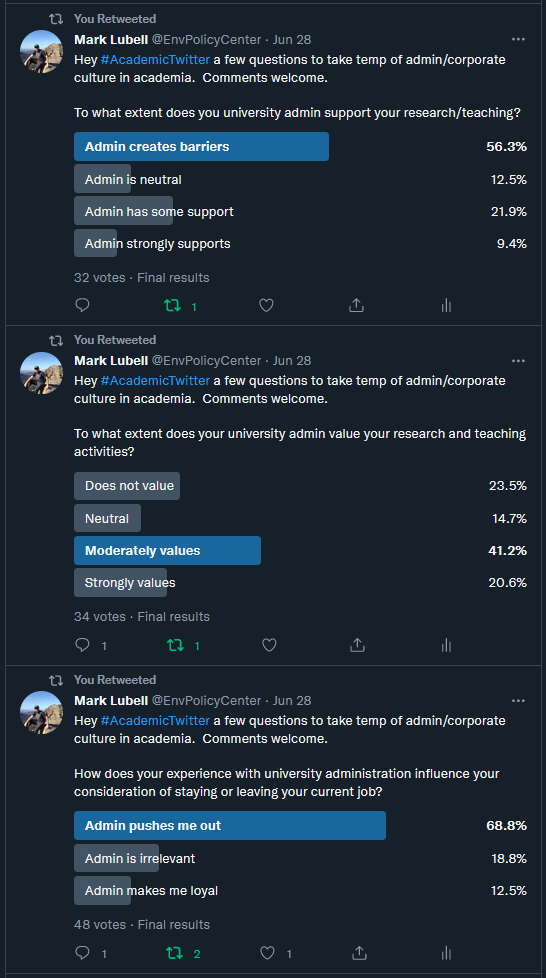
Professors on the Frontline of the Academic Industrial Complex
Are faculty being pushed out by university admin?
Quick Summary
- The corporate culture of academia is fundamentally eroding the morale of current and future university faculty
Nature recently published a perspective "Has the ‘great resignation’ hit academia?" In discussing faculty discontent with academia and shifting to "non-academic" jobs, one factoid they cite is "Forty-one per cent of mid-career researchers — compared with 32% of early-career scientists — reported that organizational politics or bureaucracy frequently or always frustrated their efforts to do a good job". What is it about the corporate culture of academia that is causing this type of discontent, and what can we do about it?
I think the corporate culture and governance of academia is heading towards a major global reckoning. Benjamin Ginsberg's book "Fall of the Faculty: The Rise of the All-Administrative University and Why it Matters" does an awesome job of analyzing some of the root causes, especially with respect to the administrative bloat relative to faculty numbers. Following the idea of the "military industrial complex", one might call this the "Academic Industrial Complex", and part of this is treating universities like a business with particular outputs being the key goals, such as student credit hours, number of publications, and amount of research funding. What I'm particularly concerned about is the corporate culture of the academic-industrial complex, and how it treats the faculty who are the human beings implementing (what should be) the university mission of producing and distributing knowledge for future generations. I think about faculty as the front-line soldiers in this mission. We directly interface with students in teaching, which is distributing knowledge. We implement the research projects--producing the knowledge. The administration is like the back area in the military, the supply chains, the headquarters. The admin needs to empower the front-line employees to actually do the mission, and the success of the mission depends on the collective effort of the faculty (there are public good characteristics--read this Krep's article on the importance of corporate culture). But they often fail to do so. Instead, the faculty are often treated like cogs in the machine and we are evaluated on the management metrics.
Just for fun I put up some Twitter polls to take the temperature of my corner of #academictwitter (I don't know why I did this....probably because I'm currently wrestling with negotiating a contract between a California state agency and UC Davis and the amount of back and forth and irrelevant detail is...amazing....). Caveat to poll: non-scientific, convenience sample, most likely some selection bias towards whining, small N, problematic question wording. The image below summarizes the results, and I will use the following shorthand labels for each question: "barriers", "values", "loyalty". Even with the caveats, I think the results are interesting and indicative of how faculty perceive university corporate culture. In response to the "barriers" question, the majority of the respondents think admin creates barriers rather than supports faculty teaching/research (the frontline activities). The "loyalty" question is consistent--nearly 70% of the respondents feel that their admin experience is a "push" factor that influences whether they stay in their job. Their experience with admin does not create loyalty that might motivate them to really work hard to fulfill the mission of the university. The "loyalty" question is clearly directly related to how university admin contributes to the "great resignation", and reflects the morale and discontent of many faculty.
The question about whether university admin "values" your research and teaching has a different distribution of responses, which is not clearly aligned with the other two questions. The contrast between the "value" question and the other questions is probably a function of bad question wording to some extent, or at least the way people are interpreting the concept "value". One interpretation is that the university does value research/teaching, because those are measurable outputs--of course they value research/teaching....just like the Army values front-line soldiers who go out and accomplish a combat mission. But what I really had in mind was "Does the admin value YOUR CONTRIBUTION to that mission? Do they recognize the work you put in, the value of your academic perspective?" A lot of faculty feel the admin rarely expresses gratitude for their work; they just expect the cogs to keep turning. A differently worded question about recognition of contribution, would probably garner responses more in line with the "barriers" and "loyalty" questions.

So what can be done about all of this? The rise of the administrative university and associated corporate culture has evolved over a long period of time, is at least partly an organizational response to outside factors (e.g., federal funding agency requirements), and will be very resistant to change. And this isn't a problem of one university, such that you can just take a job at a different university and suddenly find an empowering corporate culture. I would ask university administrators to change their mindset as much as possible. Every admin decision should consider how to empower front-line employees to actually do the jobs and activities needed fulfill the university mission. Reduce barriers, do not create new barriers. Get resources into the hands of faculty as much as possible. Work on creating a corporate culture that values the work of faculty, does not just keep adding new administrative tasks that have no clear purpose, recognize faculty as human beings that you really would like to keep around rather than just some easily replaceable part of the machine. Such changes in thinking might at least put a dent in the problem.
I'll close with a mea culpa of sorts. Being a university professor does take a lot of work, but there are far more labor intensive, lower paying, risky, and inhumane jobs out there in the world. Most university faculty are complaining from a position of privilege, and it isn't totally inappropriate to tell us to "stop whining". Many of us enjoy being professors DESPITE the university admin(see 19% of respondents who say "admin is irrelevant" in "loyalty" question)--we really love pursuing knowledge, the topics we research, interacting with smart students, helping contribute to the future of society. But even with the mea culpa, universities play an essential function in global society. The entire sector of higher education needs to think about how to create a corporate culture that reduces barriers and inspires faculty to pursue this critical mission.

Disqus Comments